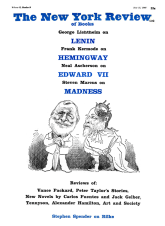DOCKERY AND SON
“Dockery was junior to you,
Wasn’t he?” said the Dean. “His son’s here now.”
Death-suited, visitant, I nod. “And do
You keep in touch with—” Or remember how
Black-gowned, unbreakfasted, and still half-tight
We used to stand before that desk, to give
“Our version” of “these incidents last night”?
I try the door of where I used to live:
Locked. The lawn spreads dazzlingly wide.
A known bell chimes. I catch my train, ignored.
Canal and clouds and college subside
Slowly from view. But Dockery, good Lord,
Anyone up today must have been born
In ’43, when I was twenty-one
If he was younger, did he get this son
At nineteen, twenty? Was he that withdrawn
High-collared public-schoolboy, sharing rooms
With Cartwright who was killed? Well, it just shows
How much…How little…Yawning, I suppose
I fell asleep, waking at the fumes
And furnace-glares of Sheffield, where I changed,
And ate an awful pie, and walked along
The platform to its end to see the ranged
Joining and parting lines reflect a strong
Unhindered moon. To have no son, no wife,
No house or land still seemed quite natural.
Only a numbness registered the shock
Of finding out how much had gone of life,
How widely from the others. Dockery, now:
Only nineteen, he must have taken stock
Of what he wanted, and been capable
Of…No, that’s not the difference: rather, how
Convinced he was he should be added to!
Why did he think adding meant increase?
To me it was dilution. Where do these
Innate assumptions come from? Not from what
We think truest, or most want to do:
Those warp tight-shut, like doors. They’re more a style
Our lives bring with them: habit for a while,
Suddenly they harden into all we’ve got.
And how we got it; looked back on, they rear
Like sand-clouds, thick and close, embodying
For Dockery a son, for me nothing,
Nothing with all a son’s harsh patronage.
Life is first boredom, then fear.
Whether or not we use it, it goes,
And leaves what something hidden from us chose,
And age, and then the only end of age.
HOME IS SO SAD
Home is so sad. It stays as it was left,
Shaped to the comfort of the last to go
As if to win them back. Instead, bereft
Of anyone to please, it withers so,
Having no heart to put aside the theft
And turn again to what it started as,
A joyous shot at how things ought to be,
Long fallen wide. You can see how it was:
Look at the pictures and the cutlery
The music in the piano stool. That vase.
REFERENCE BACK
That was a pretty one, I heard you call
From the unsatisfactory hall
To the unsatisfactory room where I
Played record after record, idly,
Wasting my time at home, that you
Looked so much forward to.
Oliver’s Riverside Blues, it was. And now
I shall, I suppose, always remember how
The flock of notes those antique negroes blew
Out of Chicago air into
A huge remembering pre-electric horn
The year after I was born
Three decades later made this sudden bridge
From your unsatisfactory age
To my unsatisfactory prime.
Truly, though our element is time,
We are not suited to the long perspectives
Open at each instant of our lives.
They link us to our losses: worse,
They show us what we have as it once was,
Blindingly undiminished, just as though
By acting differently, we could have kept it so.
MCMXIV
Those long uneven lines
Standing as patiently
As if they were stretched outside
The Oval or Villa Park,
The crowns of hats, the sun
On moustached archaic faces
Grinning as if it were all
An August Bank Holiday lark;
And the shut shops, the bleached
Established names on the sunblinds,
The farthings and sovereigns,
And dark-clothed children at play
Called after kings and queens,
The tin advertisements
For cocoa and twist, and the pubs
Wide open all day;
And the countryside not caring:
The place-names all hazed over
With flowering grasses, and fields
Shadowing Domesday lines
Under wheat’s restless silence;
The differently-dressed servants
With tiny rooms in huge houses,
The dust behind limousines;
Never such innocence,
Never before or since,
As changed itself to past
Without a word—the men
Leaving the gardens tidy,
The thousands of marriages
Lasting a little while longer:
Never such innocence again.
This Issue
June 11, 1964



